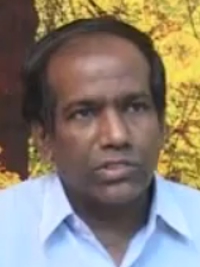 Acharya Mahapragya (14 June 1920 - 9 May 2010) was the tenth Acharya, chief pontiff, of Jain Swetambar Terapanth.
Acharya Mahapragya (14 June 1920 - 9 May 2010) was the tenth Acharya, chief pontiff, of Jain Swetambar Terapanth.
I first met him in Rajasthan, some 10 years ago, when I had gone there with my family. Since then, I met him atleast six times and shared platform with him in Delhi and Mumbai conferences. He knew my work in the field of Holistic Healing and Sarva Dharma Samabhav and spoke glowingly about it, which Astha television channel reported and I received several phone calls.
In India, there are thousands of Holy men, many of them fake, who enslave followers with their rotten philosophy rather than uplifting them, because religion has become a big tax free business.
Acharya Mahapragya was a doyen among true spiritual leaders and his last book co-authored with Dr. APJ Abdul Kalam, Ex President of India (which was sent to me as a gift) is a fine book, which now will have more value.
While other so-called Holy men directly and indirectly fanned communal passions, which engulfed Gandhi's Gujarat in worst conflagration, Acharya was the only Gurudev, who stepped out to douse the flames of communalism. Like Swami Vivekanand, Acharya Mahapragya walked across India on foot addressing public meetings. From 2001 to 2009, he walked through 87 districts of Gujarat, Maharashtra, Madhya Pradesh, Haryana, Delhi, Uttar Pradesh, Punjab and Chandigarh. He traversed more than 100,000 km on foot covering over 10,000 villages reaching out to the masses spreading the message of harmony and peace.
This Ahimsa Yatra allowed him to come into direct contact with farmers and the poor people of the villages he visited. Through his public discourses, Acharya created awareness on nonviolence, unemployment eradication, leading a life free from drug addiction and other bad habits, communal harmony, healthy living, and harmonious social and personal lives. The villages and towns trekked by him became centres of training in nonviolence and holistic development, as more than 40,000 volunteers, who were deployed to help in this Ahimsa Yatra stayed back to work in the villages.
Mahapragya (one with pragya chaksu or knowledge eye or man of wisdom) was the Janak of Preksha meditation, which he perfected and taught since 1970. Preksha meditation can be divided into Yogasana, Pranaayam, Meditation, Mantra Jaap and Therapy. Many Preksha meditation centers are in operation across the world. Research, exhaustive training, and studies on Preksha meditation is an important activity at Jain Vishva Bharati University, which he headed.
Mahapragya played a stellar role in the Anuvrat movement launched on 2 March 1949 by his guru Acharya Tulsi. The ultimate aim of Anuvrat is to create a nonviolent socio-political world order with the help of a worldwide network of self-transformed people. Since its inception it has inspired millions of people to practice purity and self-discipline in personal life. After Tulsi's demise, Mahapragya headed this great movement and took it to its pinnacle, since he was above any sectarian bias.
On 29 January 1931, he became a monk at the age of ten. He had a great learning capacity and robust memory. Acharya Mahapragya made an in-depth study of Jain scriptures under Acharya Tulsi's tutelage, became a scholar of Jain Agamas, and a critic of western philosophy. By age 22, he was competent in Hindi, Sanskrit, Prakrit, and Rajasthani languages and literature. Later he learnt English. A thirst for knowledge led him also to study biology, ayurveda, yoga, nature cure, politics, economics, and sociology.
Mahapragya has done extensive work on Anekantvad - the philosophy of nonabsolutism propounded by Lord Mahaveer, and showed how one could improve thought process towards Anekant and use it for a peaceful life and co-existence. His book Anekanta - The Third Eye unfolds this philosophy. His writings on economics, likewise, provide paradigm shift through which one could build a peaceful society free from exploitation. As World Social Forum said, "Another World Is Possible".
On religions, Mahapragya avers: "The religion which does not bring about a change in a man’s life, which does not impart peace to him, deserves to be thrown into the river Ganges rather than carried on as burden on one’s shoulders. Rituals or idol worship alone are not enough unless one’s conduct also gets transformed. Religion is not confined only to temples, mosques, or churches, but extends to the man’s day-to-day living as well.... I believe in that religion which has moral values at its foundation and spirituality at its peak".
In Acharya Mahapragya's discourses, poems, essays, books, reports one finds the ‘Spiritual Ideal’ of the 'Wonder called India' - the cradle of civilisation.
"Mahapragya observed silence (mauna) for more than three hours during the evening hours, daily. The only evening he missed was when he left his body on 9 May 2010 at 2:52 pm in Sardarshahar, in Churu District, Rajasthan, the place where he gained monkhood", wrote his Kolkota based relative, RTI Activist Milap Choraria, to me within an hour of his mahaparinirvan.
May the soul of this Prophet of Ahimsa guard the destiny of India in these difficult times.
 Dr. Leo Rebello
Dr. Leo Rebello